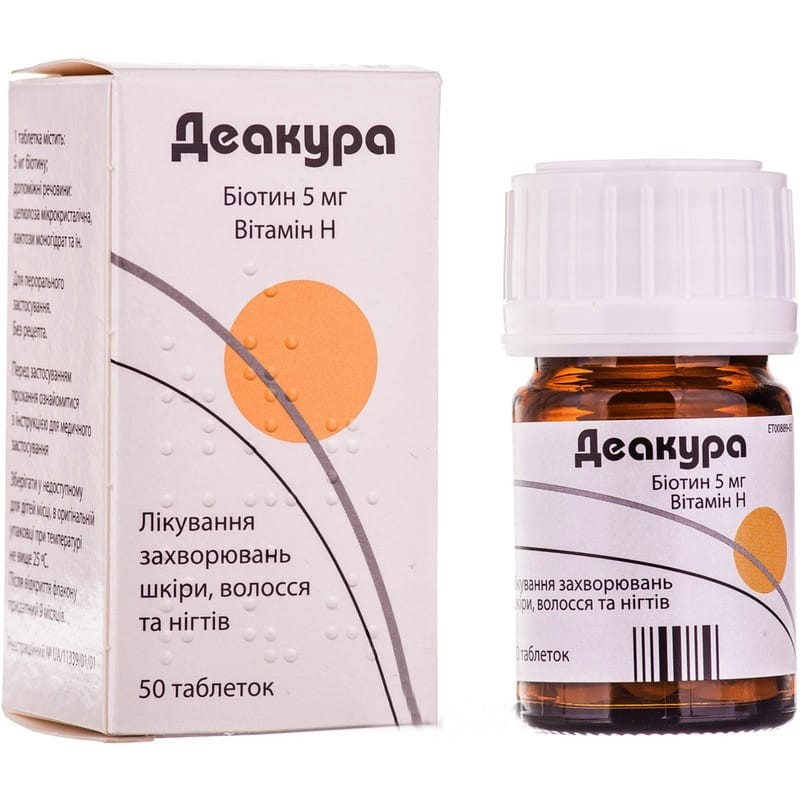



 Secure and encrypted payment processing
Secure and encrypted payment processing We ship to over 40 countries including the USA, UK, Europe, Australia and Japan
We ship to over 40 countries including the USA, UK, Europe, Australia and Japan Guaranteed refund or reship if you haven't received your order
Guaranteed refund or reship if you haven't received your orderBiotin is vital for the development and growth of cells. as a coenzyme, it plays an important role in gluconeogenesis, lipogenesis, biotransformation of propionates, and the breakdown of leucine. Biotin deficiency can occur with an unbalanced diet, prolonged diets and the use of raw egg white, with parenteral nutrition, with malabsorption syndrome, after resection of the small intestine, with multiple carboxylase deficiency associated with biotin, in patients undergoing hemodialysis.
Biotin (Vitamin H, Vitamin B7) is a water-soluble vitamin of group B. In the body, biotin plays an important role in the metabolism of carbohydrates, fats and proteins, and is vital for the normal growth and development of cells. When it enters the body, biotin acts as a coenzyme of carboxylase, has an insulin-like effect and takes part in the process of gluconeogenesis (due to participation in the synthesis of glucokinase), as a result of which it helps stabilize the blood glucose content and improves the function of the nervous system. Biotin is a synergist of other B vitamins, folic acid, pantothenic acid, cyanocobalamin. There is evidence of the participation of biotin in the synthesis of purine nucleotides. Biotin is a source of sulfur, which takes part in the synthesis of protein - collagen, thus positively affecting the structure of the skin and its appendages (hair, nails).
Biotin enters the human body with food, and is also synthesized by intestinal microflora. Absorption of free biotin begins already in the upper parts of the small intestine. Here, the biotin molecule penetrates through the intestinal wall in an unchanged form.
Absorption occurs mainly due to diffusion.
The binding of biotin to plasma proteins is 80%.
The concentration of free or only weakly bound biotin in the blood is, as a rule, from 200 to 1200 μg / L. Biotin is excreted in urine (from 6 to 50 μg / day) and feces. Biotin is excreted unchanged (about 50%) and in the form of biologically inactive metabolites. T½ depends on the size of the administered dose and is almost 26 hours after the administration of the dose of 100 μg / kg body weight. In patients with biotinidase T deficiency½ after the introduction of the same dose is reduced to 10-14 hours
Treatment of diseases caused by biotin deficiency: diseases of the skin, nails, hair.
Treatment of genetically determined enzymes associated with biotin (multiple carboxylase deficiency).
The recommended dose for the treatment of diseases of nails, hair, skin is 1 tablet per day (which corresponds to 2.5 mg of biotin). to obtain a quick effect, it is recommended to double the dose during the first week of treatment (the daily dose is 5 mg of biotin).
For the treatment of genetically determined enzymes associated with biotin (multiple carboxylase deficiency), 4-8 tablets are prescribed (daily dose - up to 20 mg of biotin) in 1-2 doses per day.
The duration of treatment depends on the nature and course of the disease and is usually 1 month.
Hypersensitivity to biotin or other components of the drug.
Allergic reactions on the skin (urticaria) are very rare. in case of any adverse reactions, it is recommended to stop treatment and consult a doctor.
The drug contains lactose, therefore, in patients with rare hereditary forms of galactose intolerance, lactase deficiency or glucose-galactose malabsorption syndrome, the drug should not be used.
Use during pregnancy and lactation. Before use, consult a doctor.
Children. There are no data on the use of the drug in children.
The ability to influence the reaction rate when driving vehicles or working with other mechanisms. Does not affect.
There is information that anticonvulsants reduce the level of biotin in blood plasma.
Eating large amounts of raw eggs for 2–3 weeks can cause biotin deficiency.
Pantothenic acid in high doses competes with biotin, so their simultaneous use should be avoided.
Not reported.
At a temperature not exceeding 25 ° C.